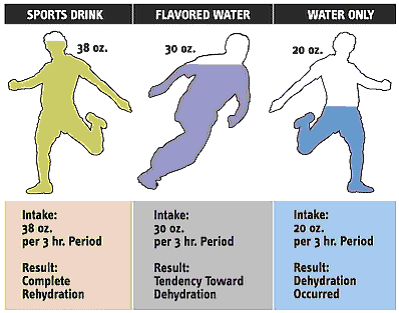
-
Dehydration is PREVENTABLE
As temperatures rise, so do your children's risk of suffering dehydration and heat illnesses. Teach your children to take special precautions on "Defeat the Heat" days - when the heat index* is 87° Fahrenheit or higher.
* Heat index is the temperature the body feels when heat and humidity are combined .HELP YOUR CHILD DEFEAT THE HEAT
· Think of fluids as essential safety equipment for sports, like a bicycle helmet or shin guards - always pack a squeeze bottle for your child's practice or game.
· Leading health professional organizations recommend kids drink at regular intervals, not just when thirsty. By the time thirst kicks in, they're likely already dehydrated.
The key to prevention is drinking the right amount of the right fluid.
Fluid Examples for Kids:
Following a drinking schedule helps ensure that your children drink enough to stay hydrated without over drinking.When Kids < 90 lbs. Kids > 90 lbs. 1 hr. before activity 3-6 oz. of fluid 6-12 oz. of fluid During activity, every 20 minutes 3-5 oz. of fluid 6-9 oz. of fluid After activity, to replace fluids lost through sweat Up to 8 oz. of fluid, per 1/2 lb. lost Up to 12 oz. of fluid, per 1/2 lb lost THE BEST FLUID TO DRINK
While water is readily available to most kids, research shows active kids don't always drink enough water to stay fully hydrated.
· Juices have too much sugar, so it takes longer for the fluid to be absorbed into the body.
· A scientifically formulated sports drink* helps kids stay better hydrated because it:
o Replaces electrolytes active children lose through sweat, helping to maintain the right balance of fluids in the body;
o Contains flavor and sodium to encourage drinking when active.Research shows kids will drink considerable more when drinking a sports drink like Gatorade, than water and as a result stay well hydrated and safe on the playing field.
Treatment
Prevention is the goal, but if dehydration or heat illness strikes, it's important to know the symptoms. If your young athletes complain of any of the following symptoms, move them to a shaded area and give them fluids to rehydrate.
Early warning signs* of dehydration may include:
· Thirst
· Irritability
· Headache
· Dizziness
· Muscle Cramping
· Nausea
· Vomiting
· Weakness
· Decreased Performance
If your child's condition does not improve quickly, seek further medical attention from a certified athletic trainer or dial 911 for emergency medical services.From the National Athletic Trainers' Association

